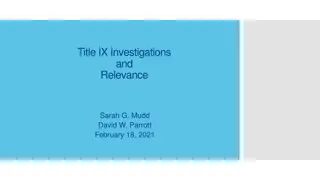Evidence in Investigations
Learn about the principles and types of evidence in investigations, including inculpatory and exculpatory evidence, physical, documentary, demonstrative, and verbal evidence. Explore sources of evidence and the significance of collecting relevant information to ensure a fair investigative process.
0 views • 14 slides
Title IX Investigations and Relevance
The purpose of a Title IX investigation is to collect relevant evidence, both inculpatory and exculpatory, to allow for impartial decision-making regarding reported sexual harassment cases. Parties involved must receive sufficient notice and have opportunities to participate, present statements, and
1 views • 32 slides
Ethics in Prosecution: Balancing Justice and Duty
Delve into the complexities of prosecutorial ethics as explored in the TV series "Billions," discussing the duty of prosecutors to seek justice, ethical responsibilities outlined in the ABA Model Rule 3.8, and principles guiding federal prosecution. The narrative highlights challenges such as handli
0 views • 13 slides
Brady v. Maryland: The Case of Prosecutorial Misconduct
Brady v. Maryland was a landmark case where the defendant, Mr. Brady, was convicted of murder and sentenced to death. The case revolved around the prosecution's failure to disclose exculpatory evidence, violating Mr. Brady's due process rights. The Supreme Court held that prosecutors must share favo
0 views • 32 slides



